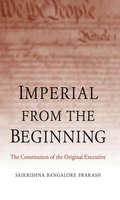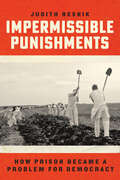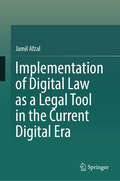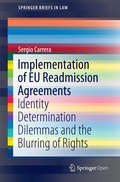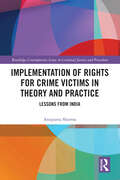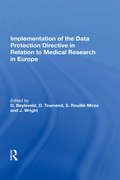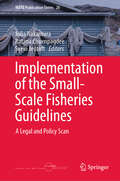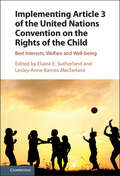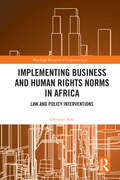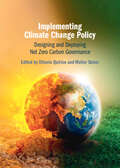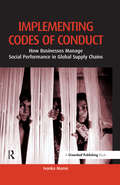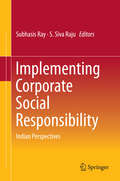- Table View
- List View
Imperativeness in Private International Law: A View from Europe
by Giovanni ZarraThis book centres on the ways in which the concept of imperativeness has found expression in private international law (PIL) and discusses “imperative norms”, and “imperativeness” as their intrinsic quality, examining the rules or principles that protect fundamental interests and/or the values of a state so as to require their application at any cost and without exceptions. Discussing imperative norms in PIL means referring to international public policy and overriding mandatory rules: in this book the origins, content, scope and effects of both these forms of imperativeness are analyzed in depth. This is a subject deserving further study, considering that very divergent opinions are still emerging within academia and case law regarding the differences between international public policy and overriding mandatory rules as well as with regard to their way of functioning.By using an approach mainly based on an analysis of the case law of the CJEU and of the courts of the various European countries, the book delves into the origin of imperativeness since Roman law, explains how imperative norms have evolved in the different conceptions of private international law, and clarifies the foundation of the differences between international public policy and overriding mandatory rules and how these concepts are used in EU Regulations on PIL (and in the practice related to these sources of law). Finally, the work discusses the influence of EU and public international law sources on the concept of imperativeness within the legal systems of European countries and whether a minimum content of imperativeness – mainly aimed at ensuring the protection of fundamental human rights in transnational relationships – between these countries has emerged. The book will prove an essential tool for academics with an interest in the analysis of these general concepts and practitioners having to deal with the functioning of imperative norms in litigation cases and in the drafting of international contracts. Giovanni Zarra is Assistant professor of international law and private international law and transnational litigation in the Department of Law of the Federico II University of Naples.
Imperatives for Legal Education Research: Then, Now and Tomorrow (Emerging Legal Education)
by Ben Golder Marina Nehme Alex Steel Prue VinesIn the last few decades university teaching has been recognised as an activity which can be studied and improved through educational scholarship. In some disciplines this is now well established. It remains emergent in legal education. The field is rich with questions to be answered, issues to be raised. This book provides the first overall review of legal education scholarship. The chapters outline the history of legal education research and provide a detailed analysis of the trends in areas of publication. Beyond this, the book suggests a typology for further conceptualising the field and a series of suggested paths for future research. The book originated from the 2017 UNSW conference "Research in Legal Education: State of the Art?" It features internationally respected authors who bring their perspectives on how legal education – as a field of research – should be conceptualised. The collection is arranged into three themes. First, a historical view is taken of the emergence of legal education scholarship and its roots that predate modern educational theory. Secondly, the book provides overviews of the extant field of publications, highlighting areas of interest and neglect, and delineating the trends in current publication. Thirdly, the book provides a set of suggested typologies for describing legal education research and a series of essays for future directions which both critique current approaches and provide inspiration for future directions. The State of Legal Education Research represents an authoritative introduction to the field, a set of conceptual tools with which to describe it, and inspiration for researchers to expand and grow research into legal education.
Imperfect Institutions: Possibilities and Limits of Reform
by Thrainn EggertssonThe emergence of New Institutional Economics toward the end of the twentieth century profoundly changed our ideas about the organization of economic systems and their social and political foundations. Imperfect Institutions explores recent developments in this field and pushes the discussion forward by allowing for incomplete knowledge of social systems and unexpected system dynamics and, above all, by focusing explicitly on institutional policy. Empirical studies extending from Africa to Iceland are cited in support of the theoretical argument. In Imperfect Institutions Thráinn Eggertsson extends his attempt to integrate and develop the new field that began with his acclaimed Economic Behavior and Institutions (1990), which has been translated into six languages. This latest work analyzes why institutions that create relative economic backwardness emerge and persist and considers the possibilities and limits of institutional reform.
Imperfect Justice
by Cara C. Putman“This is the way legal thrillers are meant to be—compelling, intelligent, and deeply satisfying.” —Randy Singer, author of Rule of LawTHE POLICE SAY THE WOMAN WAS A MURDERER. EMILIE WESLEY KNOWS THEY CAN’T BE TALKING ABOUT HER CLIENT . . . CAN THEY?To the world it seems obvious: Kaylene Adams killed her daughter and then was shot by police. Attorney Emilie Wesley knows a different story: Kaylene would never hurt anyone and was looking for a way out of a controlling, abusive relationship. Her death shakes Emilie’s belief that she can make a difference for women in violent marriages. Self-doubt plagues her as she struggles to continue her work in the wake of the tragedy.Reid Billings thought he knew his sister—right up until he learned how she died. He discovers a letter from Kaylene begging him to fight for custody of her daughters if anything should happen to her. No attorney in her right mind would support an uncle instead of the father in a custody case, but Kaylene’s letter claims Emilie Wesley will help him.Thrown together in a race to save Kaylene’s surviving daughter, Emily and Reid pursue the constantly evasive truth. If they can hang on to hope together, can they save a young girl—and find a future for themselves in the process?
Imperfect Justice: Prosecuting Casey Anthony
by Lisa Pulitzer Jeff AshtonThe definitive insider’s account of the 2011 case of a Florida mother accused of killing her own daughter . . . and the verdict that shocked the nation.It was the trial that stunned America. On July 5, 2011, nearly three years after her initial arrest, Casey Anthony walked away, virtually scot-free, from one of the most sensational murder trials of all time. She’d been accused of killing her daughter, Caylee, but the trial only left behind more questions: Was she actually innocent? What really happened to Caylee? Was this what justice really looked like?In Imperfect Justice, prosecutor Jeff Ashton, one of the principal players in the case’s drama, sheds light on those questions and much more, telling the behind-the-scenes story of the investigation, the trial, and the now-infamous verdict. Complete with never-before-revealed information about the case and the accused, Ashton examines what the prosecution got right, what they got wrong, and why he remains completely convinced of Casey Anthony’s guilt.
Imperfect Victims: Criminalized Survivors and the Promise of Abolition Feminism (Gender and Justice #8)
by Leigh GoodmarkA profound, compelling argument for abolition feminism—to protect criminalized survivors of gender-based violence, we must dismantle the carceral system. Since the 1970s, anti-violence advocates have worked to make the legal system more responsive to gender-based violence. But greater state intervention in cases of intimate partner violence, rape, sexual assault, and trafficking has led to the arrest, prosecution, conviction, and incarceration of victims, particularly women of color and trans and gender-nonconforming people. Imperfect Victims argues that only dismantling the system will bring that punishment to an end. Amplifying the voices of survivors, including her own clients, abolitionist law professor Leigh Goodmark deftly guides readers on a step-by-step journey through the criminalization of survival. Abolition feminism reveals the possibility of a just world beyond the carceral state, which is fundamentally unable to respond to, let alone remedy, harm. As Imperfect Victims shows, abolition feminism is the only politics and practice that can undo the indescribable damage inflicted on survivors by the very system purporting to protect them.
Imperial Canada Inc.
by Alain Deneault William SacherAsks (and answers) the simple question: why is Canada home to more than 70% of the world's mining companies?
Imperial Nature: The World Bank and Struggles for Social Justice in the Age of Globalization
by Michael GoldmanWhy is the World Bank so successful? How has it gained power even at moments in history when it seemed likely to fall? This pathbreaking book is the first close examination of the inner workings of the Bank, the foundations of its achievements, its propensity for intensifying the problems it intends to cure, and its remarkable ability to tame criticism and extend its own reach. Michael Goldman takes us inside World Bank headquarters in Washington, D. C. , and then to Bank project sites around the globe. He explains how projects funded by the Bank really work and why community activists struggle against the World Bank and its brand of development. Goldman looks at recent ventures in areas such as the environment, human rights, and good governance and reveals how-despite its poor track record-the World Bank has acquired greater authority and global power than ever before. The book sheds new light on the World Bank's role in increasing global inequalities and considers why it has become the central target for anti-globalization movements worldwide. For anyone concerned about globalization and social justice,Imperial Nature is essential reading.
Imperial from the Beginning
by Saikrishna Bangalore PrakashEminent scholar Saikrishna Prakash offers the first truly comprehensive study of the original American presidency. Drawing from a vast range of sources both well known and obscure, this volume reconstructs the powers and duties of the nation's chief executive at the Constitution's founding. Among other subjects, Prakash examines the term and structure of the office of the president, as well as the president's power as constitutional executor of the law, authority in foreign policy, role as commander in chief, level of control during emergencies, and relationship with the Congress, the courts, and the states. This ambitious and even-handed analysis counters numerous misconceptions about the presidency and fairly demonstrates that the office was seen as monarchical from its inception.
Imperialism, Sovereignty and the Making of International Law
by Antony AnghieThis book argues that the colonial confrontation was central to the formation of international law and, in particular, its founding concept, sovereignty. Traditional histories of the discipline present colonialism and non-European peoples as peripheral concerns. By contrast, Anghie argues that international law has always been animated by the 'civilizing mission' - the project of governing non-European peoples, and that the economic exploitation and cultural subordination that resulted were constitutively significant for the discipline. In developing these arguments, the book examines different phases of the colonial encounter, ranging from the sixteenth century to the League of Nations period and the current 'war on terror'. Anghie provides a new approach to the history of international law, illuminating the enduring imperial character of the discipline and its continuing importance for peoples of the Third World. This book will be of interest to students of international law and relations, history, post-colonial studies and development studies.
Impermissible Punishments: How Prison Became a Problem for Democracy
by Judith ResnikAn original transatlantic history of the invention of the corrections profession and of ensuing debates about punishment’s purposes and prisoners’ rights. Impermissible Punishments explores the history of punishment inside prisons and how governments grappled with obligations to justify the punishments they impose. Legal scholar Judith Resnik charts the creation of the corrections profession and weaves together the stories of people who made rules for prisons and the stories of those living under the resulting regimes. Resnik maps three centuries of shifting ideas, norms, and legal standards aiming to draw lines between permissible and impermissible punishments. Her account documents the impact of World War II, the United Nations, the US Civil Rights movement, and the pioneering prisoners who insisted that law should protect their individual dignity. Taking us to the present, Resnik analyzes the expansion of imprisonment, the inability of public and private prisons to provide safe housing, and the impact of abolition politics. Exploring the interdependency of people in and out of prisons, Impermissible Punishments examines what governments committed to equality owe to the people they detain and argues that many contemporary forms of punishment need to end.
Impersonations
by Sheryl HamiltonPersonhood is considered at once a sign of legal-political status and of socio-cultural agency, synonymous with the rational individual, subject, or citizen. Yet, in an era of life-extending technologies, genetic engineering, corporate social responsibility, and smart technology, the definition of the person is neither benign nor uncontested. Boundaries that previously worked to secure our place in the social order are blurring as never before. What does it mean, then, to be a person in the twenty-first century?In Impersonations, Sheryl N. Hamilton uses five different kinds of persons - corporations, women, clones, computers, and celebrities - to discuss the instability of the concept of personhood and to examine some of the ways in which broader social anxieties are expressed in these case studies. She suggests that our investment in personhood is greater now than it has been for years, and that our ongoing struggle to define the term is evident in law and popular culture. Using a cultural studies of law approach, the author examines important issues such as whether the person is a gender-neutral concept based on individual rights, the relationship between personhood and the body, and whether persons can be property.Impersonations is a highly original study that brings together legal, philosophical, and cultural expressions of personhood to enliven current debates about our place in the world.
Implementation of Digital Law as a Legal Tool in the Current Digital Era
by Jamil AfzalThis book provides a deep dive into the important issue of digital law. Researchers, students, and policymakers interested in digital law will find this book invaluable for its exploration of the nuances of a modern scenario of law. In the first part of the book, the author explains the basics of digital law and why they are so important in today's world. Next, it delves into the promise of cutting-edge digital law. This book is an important resource for anybody, from seasoned professionals who want to keep up with the latest in digital laws to students. To aid you in understanding digital laws and making important contributions to the future of digital laws, it provides a variety of insights, case studies, and practical recommendations. This book takes a multidisciplinary approach, making it useful for a broad audience, including researchers, politicians, and students, all of whom have a stake in the direction in which our digital law are headed.
Implementation of EU Readmission Agreements
by Sergio CarreraBy examining the implementation dynamics of EU Readmission Agreements (EURAs), this book addresses the practical reasons why irregular immigrants cannot be expelled. EURAs are one of the vital legal instruments framing EU external migration law with regard to the expulsion of irregular immigrants, yet their implementation has met with various obstacles. Above all, the process of determining an individual s legal identity has proven to be one of the most controversial aspects in the implementation of EURAs. The analysis shows that the process of identifying who is whose national in the context of readmission creates two existential dilemmas: first from the perspective of the sovereignty of third countries of origin and the legal standards laid out in international instruments as regards states powers in determining nationality, and second regarding the agency of the individual as a holder of fundamental human rights. How do the EURAs deal with or aim at alleviating these identity determination dilemmas? The book provides a comparative analysis of the administrative procedures and rules envisaged by EURAs aimed at proving or presuming the nationality of the persons to be readmitted to their country of origin. It focuses on the ways in which nationality is to be determined or presumed in the scope of the 2010 EURA with Pakistan, and compares it with those foreseen in the EURAs with Armenia, Azerbaijan, Cape Verde, Georgia, and Turkey. As such, the book provides a unique and up-to-date study of EURAs and their implementation challenges in the broader context of EU external migration law and policy. "
Implementation of Rights for Crime Victims in Theory and Practice: Lessons from India (Routledge Contemporary Issues in Criminal Justice and Procedure)
by Anupama SharmaThere are many different ways in which victims’ rights can be implemented. The implementation pattern may vary depending on the type of rights a jurisdiction offers and the purposes it seeks to achieve via these rights. However, there are a few basic aspects that remain common to the variation in the implementation patterns across jurisdictions. This book provides a theoretical and practical overview of such implementation patterns, their features and underlying differences. It presents theoretical models capturing the different types of implementations of victims’ rights and the purposes that they can achieve. The book also offers a framework comprising the essential aspects involved in implementation of rights such as drafting and presentation, their visibility and accessibility to victims, enforcement of rights in case of breach, and assessment and evaluation of rights to ensure constant monitoring and improvement in implementation. The framework is tested by a sample case study in New Delhi, India, which showcases how the framework can be molded and applied to assess the existing implementation of victims’ rights and the scope for reform. The book will be of interest to those working in the areas of criminal justice, criminal procedure, victimology and human rights.
Implementation of the Data Protection Directive in Relation to Medical Research in Europe
by J. Wright D. Townend D. Beyleveld S. Rouille-MirzaThe Data Protection and Medical Research in Europe: PRIVIREAL series focuses on the 'Privacy in Research Ethics and Law' EC-funded project examining the implementation of Directive 95/46/EC on data protection in relation to medical research and the role of ethics committees in European countries. The series consists of five separate volumes following the complete development of the PRIVIREAL project. This volume relates to the first stage of this project concerning the implementation of the Data Protection Directive, in particular in the area of medical research. It contains reports from 26 European countries on the implementation of the Directive, or the data protection regime, all with a specific focus on issues and questions relating to medical research. Presenting a unique resource for all those involved in data protection, medical research and their implications for each other, this title provides a valuable insight into the actual workings across Europe, including both the New Member States and the Newly Associated Member States.
Implementation of the Small-Scale Fisheries Guidelines: A Legal and Policy Scan (MARE Publication Series #28)
by Svein Jentoft Ratana Chuenpagdee Julia NakamuraThis book provides a transdisciplinary assessment of multiple countries’ legal and policy frameworks vis-à-vis the Voluntary Guidelines for Securing Sustainable Small-Scale Fisheries in the Context of Food Security and Poverty Eradication, adopted in 2014 by the Committee on Fisheries of the Food and Agriculture Organization of the United Nations. Based on an appraisal framework used to facilitate the unpacking of those frameworks, this book collects country experiences and regional perspectives on a range of cross-cutting issues underpinning the protection of the rights and the promotion of justice for small-scale fishers and their communities.This book aims to be the first collection to present a systematic and in-depth assessment of existing national legal and policy frameworks vis-à-vis the SSF Guidelines. This assessment is done through the transdisciplinary and collaborative work of researchers, governments, and civil society organizations for the analysis of the cross-thematic questions, which the contributors of this book aim to address. Firstly, what are the relevant laws and policies that matter for securing rights of small-scale fishers and their communities? How are small-scale fisheries defined by national laws and policies? How are small-scale fisheries treated (i.e., specifically or generally) in these instruments? Are there specific provisions and references to small-scale fisheries or any of its associated terminologies (e.g., artisanal, subsistence, traditional, indigenous)? Secondly, how the relevant instruments address the 8 small-scale fisheries key issues outlined in that rapid appraisal study? What are the strengths and gaps in these instruments? Do they address issues that are not covered by the SSF Guidelines? Do they contribute to clarifying other legal issues that are relevant for sustainable small-scale fisheries? Finally, since the book also aims to explore the accessibility of these legal and policy instruments for those to which they matter the most (the small-scale fishers), the following questions were also considered: What challenges do they face in knowing and understanding the relevant laws and policies in place? Which tools, measures and processes are available in the countries to ensure small-scale fishers can claim for their rights? To what extent judicial courts have recognized and/or granted rights to small-scale fishers?Chapters 11 and 20 are available open access under a Creative Commons Attribution 4.0 International License via link.springer.com.
Implementation of the United Nations Convention on the Law of the Sea: State Practice of China and Japan (Kobe University Monograph Series in Social Science Research)
by Dai Tamada Keyuan ZouThis book analyses he implementation of the United Nations Convention on the Law of the Sea (UNCLOS) in the light of state practices of China and Japan. The special character of the book can be found in its structure of comparative analysis of the practices of China and Japan in each part. The focus is on historical aspects (Part I), implementation of the UNCLOS (Part II), navigation (Part III), mid-ocean archipelagos (Part IV), the marine environment (Part V), and dispute settlement (Part VI). By taking this approach, the book elucidates a variety of aspects of history, difficulties, problems, and controversies arising from the implementation of the UNCLOS by the two nations. Furthermore, contributors from China and Japan tend to show different perspectives on the UNCLOS, which, by clarifying the need for further debate, are expected to contribute to the continuing cooperation between the academics of the two states.
Implementierung von Nachhaltigkeitskriterien im Industriebau in den Leistungsphasen 6 bis 8 (Entwicklung neuer Ansätze zum nachhaltigen Planen und Bauen)
by Alina GerstnerDie Bauindustrie trägt wesentlich zu einer nicht nachhaltigen Lebensweise bei, da sie unter anderem signifikant hohe CO₂-Emissionen, einen großen Flächen- und Ressourcenverbrauch sowie erhebliche Abfallmengen verursacht. Um nationale als auch globale Nachhaltigkeitsziele zu erreichen und eine lebenswerte Umwelt zu sichern, muss die Bauwirtschaft Verantwortung übernehmen und Bauvorhaben zielstrebig nachhaltiger planen und umsetzen. In diesem Buch wird ein Leitfaden zur Implementierung von Nachhaltigkeitskriterien speziell für Industriebauten entwickelt, der in der Objektplanung Anwendung finden soll. Der Fokus liegt dabei auf den Leistungsphasen 6 bis 8 der HOAI, da diese Phasen – welche die Ausschreibung, Vergabe und Bauausführung umfassen – als besonders relevant für die Sicherstellung einer nachhaltigen Bauweise gelten. Sie können als Schlüsselphasen betrachtet werden, in denen geplante Nachhaltigkeitsziele konkret überführt, konkretisiert sowie anschließend in der Praxis umgesetzt werden müssen. Der Leitfaden soll die Objektplanung dabei unterstützen, konkrete Ziele und Maßnahmen vorzugeben, um die Realisierung eines nachhaltigen Industriebaus zu gewährleisten. Dabei werden relevante Regelwerke, Zertifizierungs- und Bewertungssysteme sowie wissenschaftliche Arbeiten und bestehende Leitfäden detailliert untersucht. Neben den Zielsetzungen und den entsprechenden Maßnahmen jeder Leistungsphase fließen auch verschiedene Nachhaltigkeitsdimensionen wie Ökologie, Ökonomie und Soziales in die Bewertung ein, um damit eine ganzheitliche und umfassende Betrachtung der Nachhaltigkeitsaspekte zu gewährleisten. Weiterhin sollen zur Förderung einer flexiblen Gestaltung auch spezifische Projektanforderungen, wie z.B. Vorgaben der EU-Taxonomie, Zertifizierungsindikatoren oder die individuellen Wünsche des Bauherrn berücksichtigt werden. Abschließend wird der Leitfaden in einem Referenzprojekt angewendet und evaluiert, um die Praxistauglichkeit zu überprüfen und Möglichkeiten für dessen Optimierung bei zukünftigen Industriebauprojekten zu identifizieren.
Implementing Article 3 of the United Nations Convention on the Rights of the Child
by Sutherland Elaine E. Macfarlane Lesley-Anne BarnesThe UN Convention on the Rights of the Child is acknowledged as a landmark in the development of children's rights. Article 3 makes the child's best interests a primary consideration in all actions concerning children, and requires States Parties to ensure their care and protection. This volume, written by experts in children's rights from a range of jurisdictions, explores the implementation of Article 3 around the world. It opens with a contextual analysis of Article 3, before offering a critique of its implementation in various settings, including parenting, religion, domestic violence and baby switching. Amongst the themes that emerge are the challenges posed by the content of 'best interests', 'welfare' and 'well-being'; the priority to be accorded them; and the legal, socio-economic and other obstacles to legislating for children's rights. This book is essential for all readers who interact with one of the Convention's most fundamental principles.
Implementing Business and Human Rights Norms in Africa: Law And Policy Interventions (Routledge Research in Corporate Law)
by Oyeniyi AbeThis book examines the contemporary and contentious question of the critical connections between business and human rights, and the implementation of socially responsible norms in developing countries, with particular reference to Kenya, Nigeria, South Africa. Business enterprises and transnational corporate actors operate in a complex global environment, especially when operating in high risks sectors such as oil and gas, mining, construction, banking, and health care amongst others. Understanding human rights responsibilities, impacts and socially responsible behaviour for companies is therefore an essential component of corporate risk management in our current world. The release of the United Nations Guiding Principles on Business and Human Rights, an instrument consisting of 31 principles on this issue, has further underscored the emergence of a rapidly developing set of international law norms on human rights responsibilities of businesses and transnational corporations. It has also shaped the discourse on corporate accountability for human rights. In addition to minimizing litigation, financial and reputational risks, understanding and demonstrating corporate respect for human rights is vital to building a culture of trust and integrity amongst local communities, investors, and shareholders. While Africa has been at the receiving end of deleterious activities of corporate actors, it has failed to address corporate impunity and human rights violations by non-state actors. Questions abound revolving around the underpinnings of a corporate responsibility to respect human rights, that is, how non-western and particularly African conceptions of respect may help develop a ‘beyond do no harm’ approach to respect; policy discourses on human rights due diligence, human rights impact assessment; mandating corporate respect for human rights in both domestic and international law. This book examines, clarifies, and unpacks the guiding principles of a rights-based approach to development and social inclusion. It offers an excellent exposition of regulatory capacity, institutional efficacy and democratic legitimacy of governance institutions that shape development including a comprehensive analysis of how states are shaping business and human rights discourses locally to develop a critical understanding of identified issues by exploring the latest theories through comparative lenses
Implementing Climate Change Policy: Designing and Deploying Net Zero Carbon Governance
by Ottavio Quirico Walter BaberThe chapters in this volume provide an interdisciplinary and comparative analysis of the implementation of climate change policies worldwide to assess whether they are meeting the aims set out in the 'Paris Agreement'. The first part compares climate policies employed by the EU, the US, Latin America, Russia, China, the Middle East, and Africa. The second explores ways of improving key regulatory mechanisms to increase the effectiveness of greenhouse gas mitigation and adaptation measures. This book argues that the international community should improve the effectiveness of enforcement mechanisms from the standpoint of secondary norms through an integrated approach. It is an indispensable resource for undergraduate and graduate students of environmental policy and governance, public policy, law and political science, as well as policy makers. This title is part of the Flip it Open Programme and may also be available as Open Access. Check our website - Cambridge Core - for details. (150, 992)
Implementing Codes of Conduct: How Businesses Manage Social Performance in Global Supply Chains
by Ivanka MamicAt the start of the 21st century manufacturing is in the midst of a major transformation, with goods moving from factories in São Paulo, Ho Chi Minh and Guanzhou to the shelves of stores in New York, Hamburg and Sydney. As production of goods has become increasingly global, with an impact on workers and societies around the world, the ILO has sought to answer the challenging question: how best to implement voluntary corporate initiatives in value chains that stretch around the globe from a constantly changing supply base of factories both large and small? In order to address growing pressures from stakeholders, a number of global companies have adopted codes of conduct with the aim of influencing the practices of their suppliers in less-developed countries and providing a baseline of expected standards. Typically, codes of conduct draw on international labour standards, setting guidelines on a range of issues, including child labour, forced labour, wages and benefits, working hours, disciplinary practices, the right to freedom of association, health and safety, and environmental practices. Notwithstanding the array of initiatives that has emerged, anecdotal evidence suggests that, in many cases, managers both at the company and supplier level have struggled and continue to struggle with the issue of how to implement their codes of conduct. Based on interviews with hundreds of managers, activists, government officials, factory workers and workers' representatives, Implementing Codes of Conduct represents the most extensive research conducted to date into the emerging nature of corporate social responsibility and global supply chains. Its objective is to provide useful examples and lessons learned to companies, policy-makers and others interested in implementing their own code of conduct or who are actively involved in this field. This book has broad implications for firms that are serious about seeing the social and environmental objectives expressed in their corporate codes become a reality at the supplier level – implications that stretch from the boardroom to the factory floor. The book presents a model that maps a route from the creation of a vision to its implementation at the operational level. Based on research conducted in the sports footwear, apparel and retail sectors, this book provides a detailed account of the approaches currently used by leading brands and retailers and practical suggestions for other companies to follow in addressing social pressures. Given an increasingly clear link between corporate social responsibility and profits, this book serves as an invaluable tool in assisting those interested in balancing the complex demands of society and competitive concerns.
Implementing Corporate Social Responsibility
by Subhasis Ray S. Siva RajuThis book is a compilation of Corporate Social Responsibility (CSR) theory and practices, with special reference to the Indian context. Over the last few decades, which have seen the onset of globalization, emergence of the industrial sector and an increased focus on community development, much attention has been focused on the role of corporations towards developing those societies where their operations are based. The introduction and evolution of CSR theories and practice in the developed countries has given CSR theorists and practitioners the guidance to appropriately place and implement CSR initiatives to help develop their role in the developed societies. However, while ample literature exists on such CSR practices, little has been done to aid the development of CSR in developing countries. Characterized by peculiar economic, political and social settings, the developing world needed its own blueprint for how CSR works and how it could best succeed. The need for doing is especially pertinent to a country like India, which is presently at a very crucial threshold, economically, politically and socially. Given the need to contextualize CSR theory and practice to the developing context, several CSR theories and practices have been explored in this book, which will provide readers with a thorough understanding of CSR and its successful implementation.
Implementing Digital Forensic Readiness: From Reactive to Proactive Process, Second Edition
by Jason SachowskiImplementing Digital Forensic Readiness: From Reactive to Proactive Process, Second Edition presents the optimal way for digital forensic and IT security professionals to implement a proactive approach to digital forensics. The book details how digital forensic processes can align strategically with business operations and an already existing information and data security program. Detailing proper collection, preservation, storage, and presentation of digital evidence, the procedures outlined illustrate how digital evidence can be an essential tool in mitigating risk and redusing the impact of both internal and external, digital incidents, disputes, and crimes. By utilizing a digital forensic readiness approach and stances, a company’s preparedness and ability to take action quickly and respond as needed. In addition, this approach enhances the ability to gather evidence, as well as the relevance, reliability, and credibility of any such evidence. New chapters to this edition include Chapter 4 on Code of Ethics and Standards, Chapter 5 on Digital Forensics as a Business, and Chapter 10 on Establishing Legal Admissibility. This book offers best practices to professionals on enhancing their digital forensic program, or how to start and develop one the right way for effective forensic readiness in any corporate or enterprise setting.








